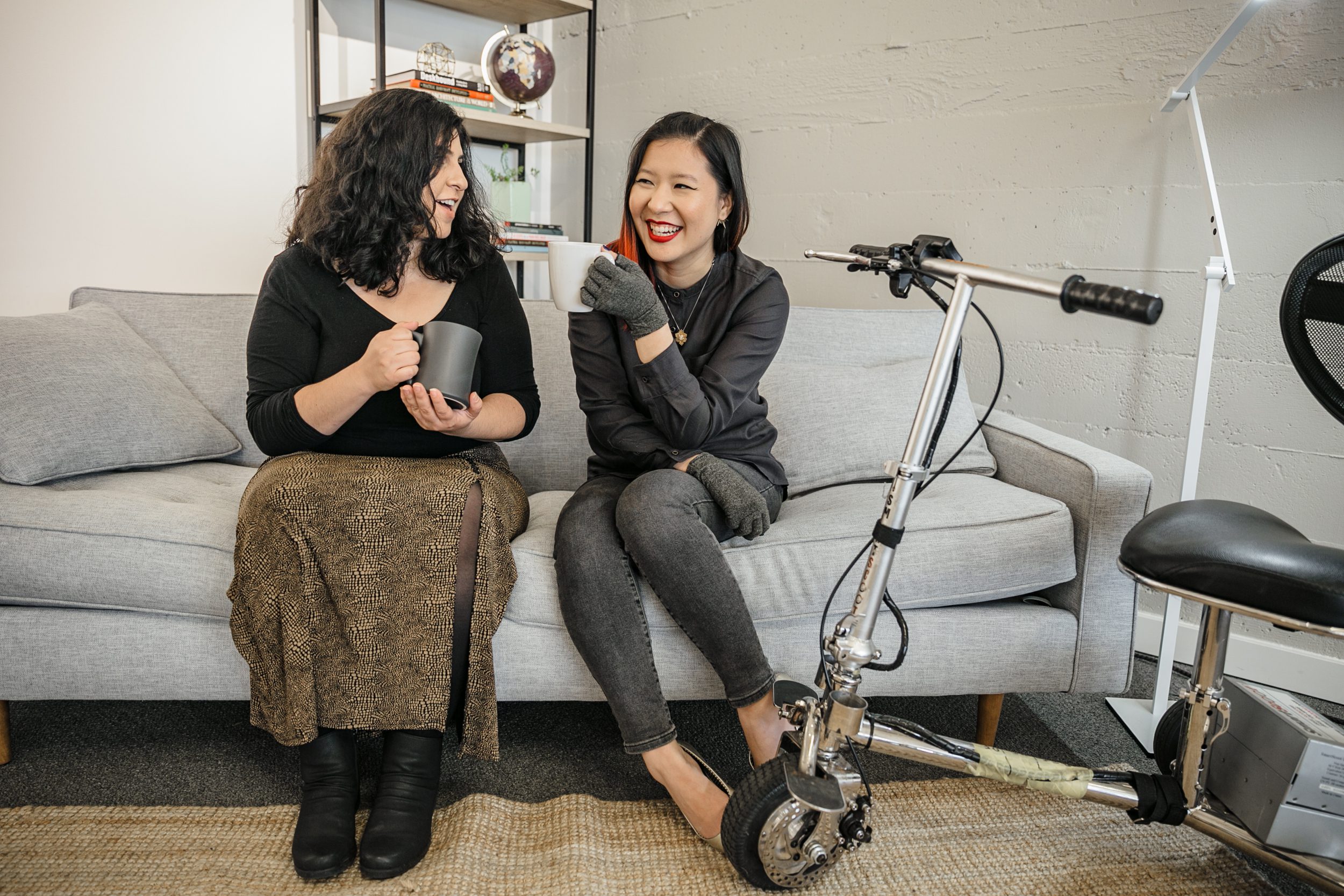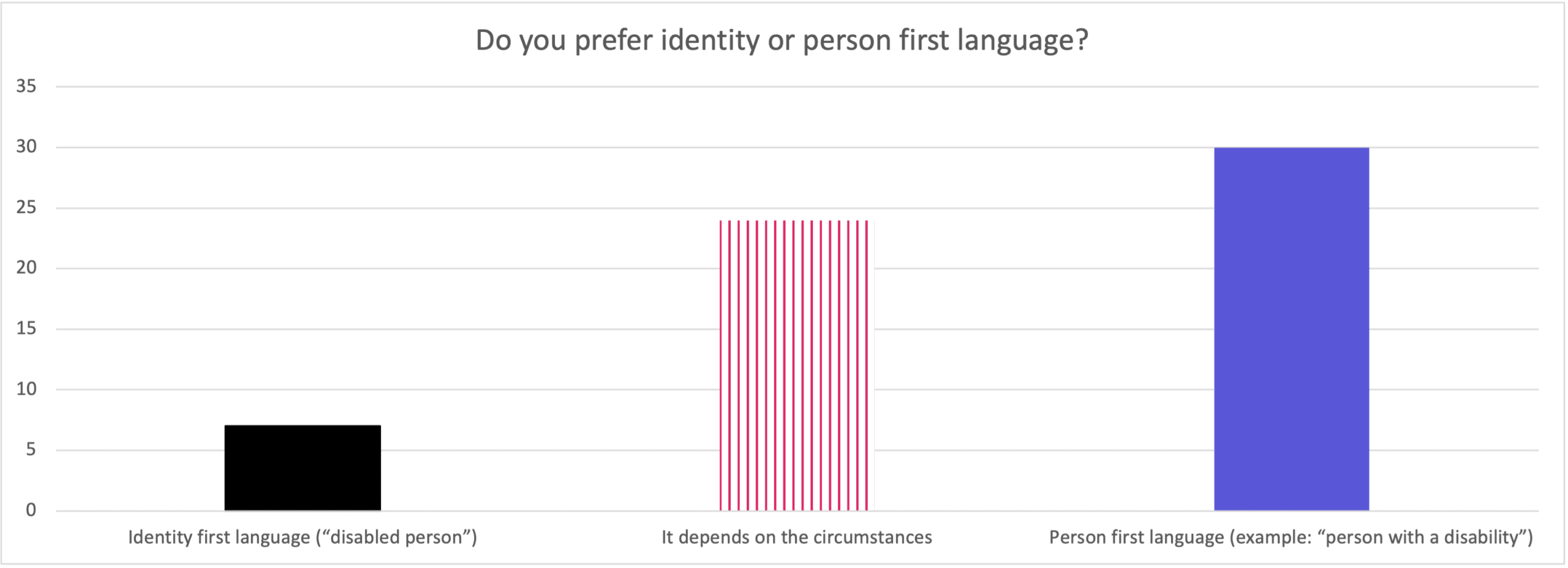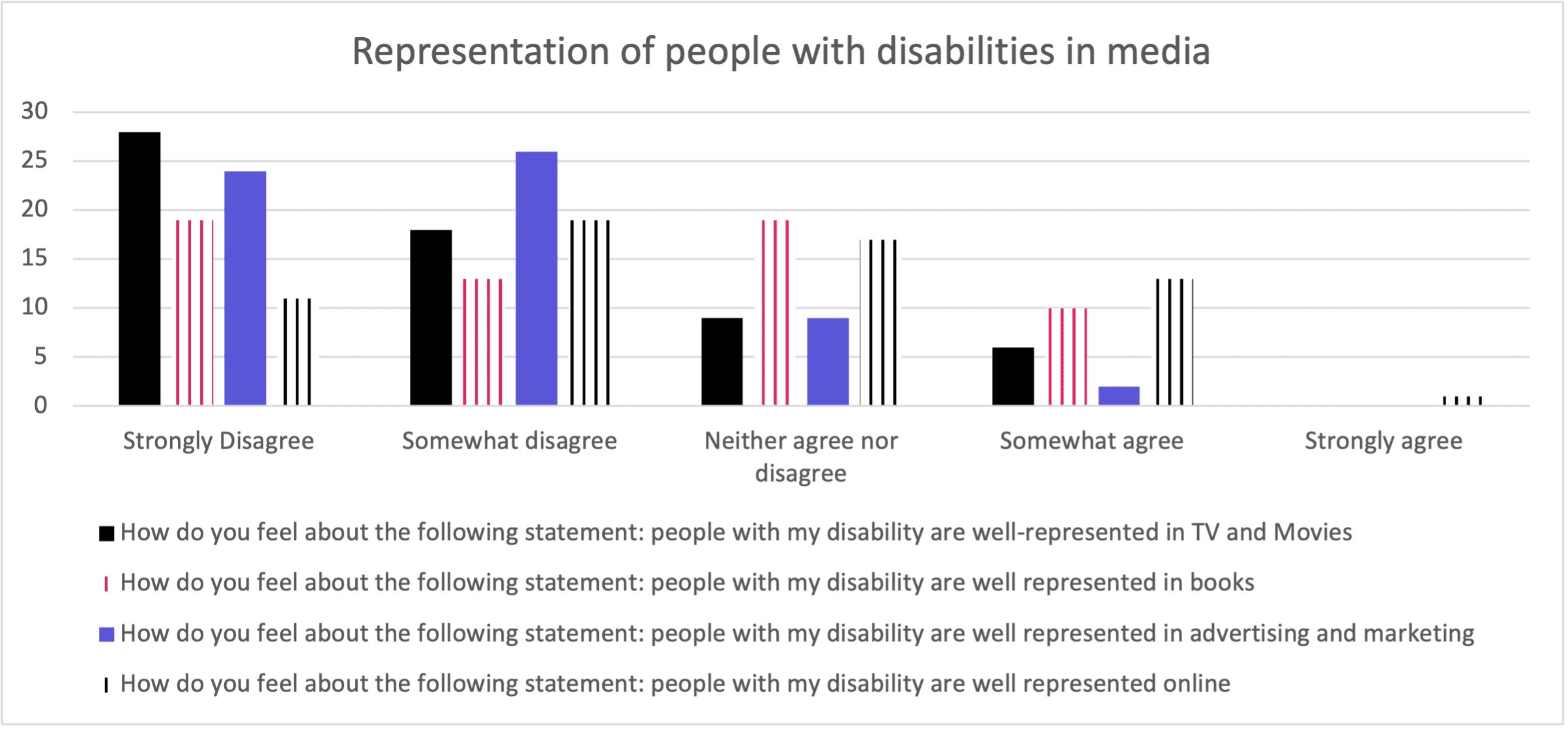
Photo Credit: Disabled and Here
Disability And Representation: A Community Perspective
Introduction
There has been a lot of discussion in the disability community over the past few years about terminology, representation, and identity, led by both grassroots organizations and individual advocates. Perhaps because of this duality, one of the things that those who have not yet regularly interacted with people with disabilities are most concerned about is how they talk about disability and identity. Organizations are also struggling with corporate policy around communication and marketing to, about, and with the disability community.
To usefully contribute to this on-going conversation, Fable surveyed our community of assistive technology users to collect their sentiments and thoughts on this important topic.
This article will present some of the insights from the quantitative and qualitative data gathered, in hopes that it will help you and your organization refine your thoughts and efforts in disability inclusion.
An important note
These topics are still matters of on-going discussion, and not every person will feel the same way about them. Just like any other group, people with disabilities are not a monolith, and different people will have different (equally valid) opinions on these subjects.
In this edition of Fable Insights, we aim to present an overview of the thoughts and feelings of our community, to help you refine your overall thinking on this topic. The data presented here should never override the preferences of any individual person with a disability. If you are a person with a disability yourself, we want you to know that you and your opinions and preferences matter, and deserve to be heard and respected, whether they are reflected in this article or not.
Disability Identity
“I don’t want my disability to identify me. I want to be known as a person first, who just happens to have a disability. My disability is just a very small part of who I am.” – Darrin R
“I don’t think I should have to remind anyone that I’m a person. We don’t say things like “person with a height advantage,” we just say, “they’re a tall person.” The [LGBTQ*] community says things like, “I’m gay” or “I’m queer.” When talking about race, we don’t say “person with X heritage.” Person-first language is extremely segregating and implies that disability is something to shy away from. It has negative connotation. I think identity-first language is the easiest way to shift perspective on disability, since there is no other group that uses person-first.” – E J
“As long as the language is respectful, I don’t care which way it is phrased.” – Marcia Y
The way people with disabilities are represented, and how they represent themselves, is intricately tied to the way we use language to talk about disability identity.
At Fable, we currently use person-first language when referring to people. This means that we prefer “person with a disability”, or “a person who is blind”. We made this decision to highlight the fact that everyone is a person first, and people are not entirely defined by disability. The alternative is known as “identity-first language” and prefers phrases like “a disabled person” or “a blind person”. While we made this choice after much intentional thought and discussion, we wanted to survey the community, and find out how they felt about the matter.
We found that, just as people change the way they represent themselves based on the situation, 39 percent of people with disabilities say that their preference for person- or identity-first language changes based on the circumstances. When people do have a strong preference, 49 percent of our community prefers person-first language, while only 11 percent prefers identity-first language.

Disability Culture
“In my opinion, capitalizing the first letter of a disability description is a backwards step. It makes a bigger deal out of the disability and possibly could put us on an unnecessary pedestal that idealizes people with disabilities and heightens the stereotype that we have some kind of superpower. I can see the capital letter expressing one’s pride for having said disability and it possibly having a part in shaping them as a person, but personally, I’m neither proud nor ashamed of my disability. It’s just one of the things that makes me human.” – Grace A
“I think capitalization of a disability emphasizes that disability as a part of a person’s identity. It also may give a person either a sense of pride or help them better accept their disability.” – Douglas L
There is a growing belief that because we have a unique identity, people with disabilities often develop a unique culture that should be recognized and valued. Some people feel that because disability identity is not defined along ethnic lines, the cultures and customs created by communities of people with disabilities go unrecognized, and people do not develop pride in their identity.
To recognize this, there has been a movement in recent years, that began in the Deaf community, to begin capitalizing the first letter of disability related terms.
When we asked Fable’s community about this, we found that it has yet to catch on. Only 8 percent of people always capitalize the term for their disability, 34 percent sometimes do, and 57 percent never do. The primary reasons for leaving these terms lower-case included not wanting to make a big deal of disability and not feeling like part of a community. Those who do capitalize the term generally do so to show pride, because they believe disability and ethnicity should be equally respected, or to highlight this aspect of themselves.

Disability-related Phrases
“I think that sometimes we live in a cancel culture that is too politically sensitive. It makes people too afraid to say the wrong thing or approach persons with disabilities. There is such a thing as being too politically correct. I personally want people to feel comfortable interacting with and discussing the topic of disability.” – Elizabeth N
“This is actually a bit annoying, but I believe in freedom of speech. I am uncomfortable with the song Amazing Grace, for example, but everyone has the right to sing it as they choose. Yes, I believe that it solidifies the negative associations, but censuring speech that is not intentionally harmful or hateful is an even larger problem.” – Jan A
There are many phrases in the English language that make use of disability related terms as metaphor or analogy. Recently, these phrases have become controversial in some circles; notably, the popular gaming website Twitch recently received highly mixed feedback after it banned the term “blind playthrough” when used to mean someone who is playing a game for the first time. But these controversies regularly lack input from people with disabilities themselves.
When we surveyed the community, 81 percent of our respondents had no problem with these phrases, while 18 percent wished people would stop using terms and phrases like this.
People who dislike these phrases said no individual has the right to restrict the freedom of speech of others, that changing the way we use language is too difficult, and that they don’t have the time or energy to advocate for this given higher priority issues. Those who have no problem with these phrases fear that restricting them may make people afraid to interact with people with disabilities, that trying to get rid of them may promote the idea that disability is shameful and believe that people with disabilities don’t have ownership of the terms used to refer to their condition.

Representation in Media
“Representation of persons with disabilities has gotten better over the years, but a lot of work still needs to be done for people with disabilities to be treated as equals. Most of the time when people with disabilities are represented in movies/TV shows, it is because society wants to be inclusive or diverse. Furthermore, up until recently ([e.g.], TV show Ordinary Joe), I had never seen people with my level of physical disability represented in movies/shows. I feel that people with disabilities are not included for their real abilities or talents. Society must actively recruit more persons with disabilities for roles in movies/TV shows, so persons with disabilities can truly be included in society.” – Sarah C
“In my experience of the shows, movies, or stories I have seen, most of the time people with disabilities are portrayed as a tragic villain or someone that suffered a tragic accident who thinks that having a disability is the end of the world. I personally would like stories where the characters can live a fulfilling life.” – Kristopher S
Language isn’t the only thing we need to think about when representing people with disabilities. Another critical aspect is making sure that the one in five people who live with a disability are equally represented in movies, TV, advertising, books, and online.
Just like every other community, people with disabilities deserve to see themselves accurately and proportionally represented in culture. Our community told us this is one area where we all have a lot of work to do. No one in our community strongly agreed that they were well represented in TV and movies, books, or advertising. In fact, the majority strongly disagreed with all these statements. They felt slightly better represented online, but even in this case the majority somewhat disagreed that they are well represented.
People with disabilities in Fable’s community feel they should be represented a lot more than they currently are. Further, when they are represented, they want to be shown as ordinary people first rather than being defined entirely by disability. Currently, people also strongly feel that existing representations overplay disability for inspiration or drama, and that those existing representations are highly inaccurate.
“I think Fetty Wap represents my disability in a positive way but it doesn’t seem like it’s intentional on his part. The fact that he presents himself without an eye prosthetic makes it obvious that he’s visually impaired. I don’t know why he chooses to not wear a prosthetic or if there’s a medical reason. Regardless, it gets people talking about his eye issues and therefore leads to conversation about vision impairment in general.” – Amy K H
The examples given where people with disabilities felt best represented all involved occasions where people with disabilities got to represent themselves. People felt better represented online, thanks to popular disability influencers on websites like YouTube and TikTok, and felt best represented by musicians and actors who themselves were people with a disability. This highlights the idea that people with disabilities need to be involved in all aspects of culture, digital or otherwise.

| Category | How do you feel about the following statement: people with my disability are well-represented in TV and Movies | How do you feel about the following statement: people with my disability are well represented in books | How do you feel about the following statement: people with my disability are well represented in advertising and marketing | How do you feel about the following statement: people with my disability are well represented online |
| Strongly Disagree | 28 | 19 | 24 | 11 |
| Somewhat disagree | 18 | 13 | 26 | 19 |
| Neither agree nor disagree | 9 | 19 | 9 | 17 |
| Somewhat agree | 6 | 10 | 2 | 13 |
| Strongly agree | 0 | 0 | 0 | 1 |
Conclusion
“I think that maybe the most important thing folks can do is to talk to disabled people and, even more importantly, listen to them. There are a great deal of assumptions and stereotypes out there, and they are quite frequently wrong.” — Gretchen M
The conversation about language and representation is still an on-going one. The most important thing you can do is make sure you’re listening! No matter what you or your organization decides about these issues, have you talked about them with people with disabilities? Did you make an intentional decision about what language you’re going to use, and why? Only when we involve the voices of people with disabilities into these conversations can we begin to make progress on ensuring that everyone is equally and accurately represented in our workplace, our culture, and our world.
If you’d like to be part of this conversation, follow Fable on LinkedIn and Twitter. If you’re ready to bring the voices of people with disabilities into your product development and accessibility training processes, book a call with Fable, and we’ll show you how.
